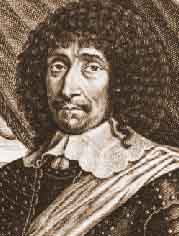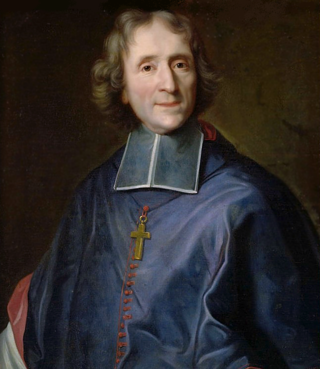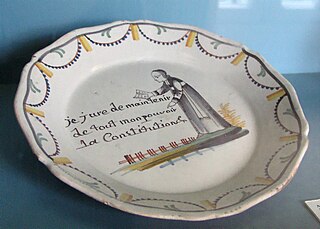
Jansenism was a 17th- and 18th-century theological movement within Roman Catholicism, primarily active in France, which arose as an attempt to reconcile the theological concepts of free will and divine grace in response to certain developments in the Roman Catholic Church, but later developing political and philosophical aspects in opposition to royal absolutism.

Jacques-Bénigne Lignel Bossuet was a French bishop and theologian. Renowned for his sermons, addresses and literary works, he is regarded as a brilliant orator and literary stylist of the French language.

César de Choiseul, 1st Duke of Choiseul, comte du Plessis-Praslin was a Marshal of France and French diplomat, generally known for the best part of his life as the Maréchal (Marshal) du Plessis-Praslin.

François de Salignac de la Mothe-Fénelon, PSS, more commonly known as François Fénelon, was a French Catholic archbishop, theologian, poet and writer. Today, he is remembered mostly as the author of The Adventures of Telemachus, first published in 1699. He was a member of the Sulpician Fathers.

The Civil Constitution of the Clergy was a law passed on 12 July 1790 during the French Revolution, that sought the complete control over the Catholic Church in France by the French government. As a result, a schism was created, resulting in an illegal and underground French Catholic Church loyal to the Papacy, and a "constitutional church" that was subservient to the State. The schism was not fully resolved until 1801. King Louis XVI ultimately granted Royal Assent to the measure after originally opposing it, but later expressed regret for having done so.
Gallicanism is the belief that popular secular authority—often represented by the monarch's or the state's authority—over the Catholic Church is comparable to that of the pope. Gallicanism is a rejection of ultramontanism; it has something in common with Anglicanism, but is nuanced, in that it plays down the authority of the Pope in church without denying that there are some authoritative elements to the office associated with being primus inter pares. Other terms for the same or similar doctrines include Erastianism, Febronianism, and Josephinism.
Unigenitus is an apostolic constitution in the form of a papal bull promulgated by Pope Clement XI in 1713. It opened the final phase of the Jansenist controversy in France. Unigenitus censured 101 propositions of Pasquier Quesnel as:
false, captious, ill-sounding, offensive to pious ears, scandalous, pernicious, rash, injurious to the Church and its practices, contumelious to Church and State, seditious, impious, blasphemous, suspected and savouring of heresy, favouring heretics, heresy, and schism, erroneous, bordering on heresy, often condemned, heretical, and reviving various heresies, especially those contained in the famous propositions of Jansenius.

Louis Antoine de Noailles, Cardinal de Noailles, second son of Anne de Noailles, 1st Duke of Noailles, was a French bishop and cardinal. His signing of the Unigenitus bull in 1728 would end the formal Jansenist controversy.

Claude Fleury, was a French priest, jurist, and ecclesiastical historian.
The Declaration of the Clergy of France was a four-article document of the 1681 assembly of the French clergy. Promulgated in 1682, it codified the principles of Gallicanism into a system for the first time into an official and definitive formula.

Louis Ellies du Pin or Dupin was a French ecclesiastical historian, who was responsible for the Nouvelle bibliothèque des auteurs ecclésiastiques.

The Diocese of Meaux is a Latin diocese of the Catholic Church in France. The diocese comprises the entire department of Seine-et-Marne. It was suffragan of the Archdiocese of Sens until 1622, and subsequently of Archdiocese of Paris.

Charles Maurice Le Tellier was a French Archbishop of Reims.

François-Étienne Caulet was a French bishop and Jansenist.

The House of Choiseul is a French noble family of chivalric extraction, first mentioned in 1060. Originally from Champagne, its cradle is the village of Choiseul. An illustrious house, its members held prominent political, ecclesiastical and military positions within the Kingdom of France. The Choiseul family is one of the oldest French families still in existence, having been identified among the families surviving into the 21st century who have been able to prove their filiation in the male line, both natural and legitimate, without interruption back to a first ancestor attested by a deed dating from before 1250.

Scipione de' Ricci was an Italian Catholic prelate, who was bishop of Pistoia from 1780 to 1791. He was sympathetic to Jansenist ideas in theology.
Nicolas Cornet was a French Catholic theologian.
Vineam Domini Sabaoth is an apostolic constitution in the form of a papal bull promulgated by Pope Clement XI in 1705 which declared that "obediential silence" is not a satisfactory response to the Formula of Submission for the Jansenists.
The assembly of the French clergy was in its origins a representative meeting of the Catholic clergy of France, held every five years, for the purpose of apportioning the financial burdens laid upon the clergy of the French Catholic Church by the kings of France. Meeting from 1560 to 1789, the Assemblies ensured to the clergy an autonomous financial administration, by which they defended themselves against taxation.

Henri du Plessis-Guénégaud, Lord of the Plessis-Belleville, Marquis de La Garnache was a French scholar and a Secretary of State during the reigns of Louis XIII and Louis XIV.













